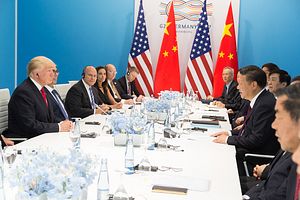The U.S.-China bilateral is often dubbed the most important relationship in the world. Graham Allison is one of the most influential scholars in elucidating the dynamics of that relationship, with his “Thucydides Trap” thesis sparking discussion and debate among officials and analysts in Washington D.C. and Beijing. Allison spoke with The Diplomat about his recent book on the topic, Destined for War: Can America and China Escape Thucydides’s Trap?, and what he sees as the future for U.S.-China relations as the balance of power between the two continues to shift.
The idea that conflict between a rising and a dominant power is the norm, rather than the exception, has been cited by both Chinese and U.S. officials. Does awareness of the Thucydides Trap on the part of both governments increase the odds that their countries can avoid war? Or, on the contrary, could it lead to a self-fulfilling prophecy?
One of the haunting quotes featured in the book comes from German Chancellor Theobald von Bethmann Hollweg. Asked after the First World War about how his choices, and those of other European statesmen, led to the most devastating war the world had seen to that point, the best he could offer was, “Ah, if we only knew.” Prior to World War I, many elites across Europe thought war was obsolete. One of the best-selling books in Europe in the decade before WWI was Norman Angell’s The Great Illusion, which persuaded millions of readers that economic interdependence had made war irrational. Unfortunately, after seven decades without great power war, many today now imagine that this is the new normal — rather than an achievement that must be sustained every day.

































